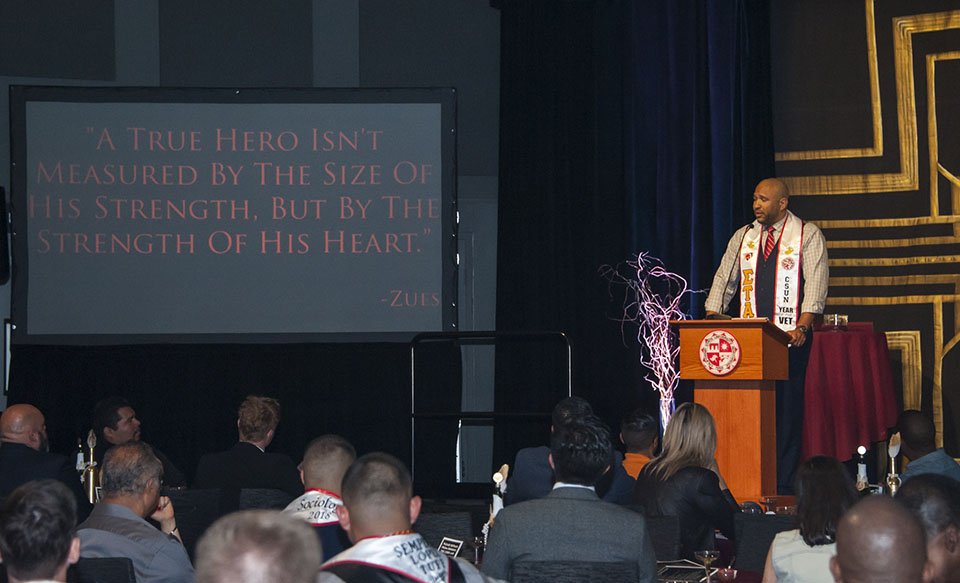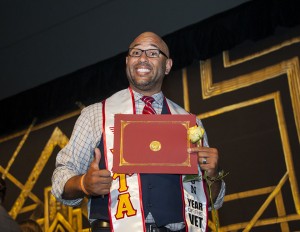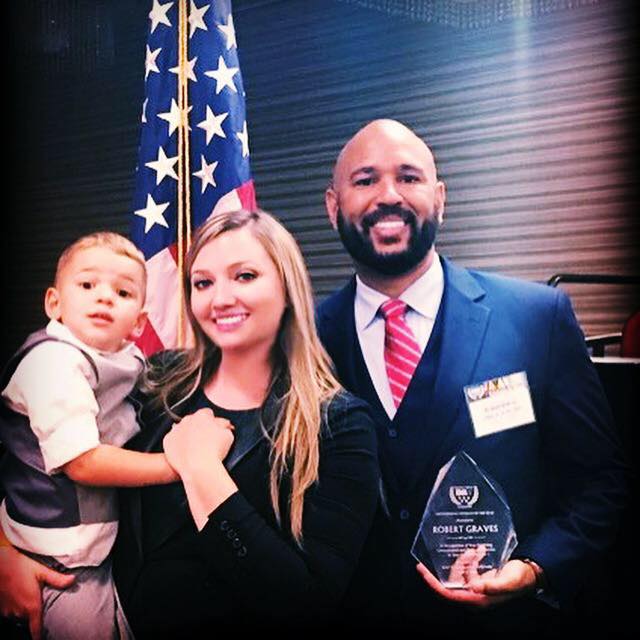‘How to Grow a Beard’: Alumnus Gives Back by Assisting Fellow Veterans

Marine Corps veteran Robert Graves ’18 (M.A., Sport Psychology) speaks to his fellow veterans and newly minted graduates at CSUN’s 2018 Veterans Graduation Reception. Photo by Patricia Carillo.
From personal experience, Robert Graves understands that many veterans suffer in silence without seeking the help they need.
Graves ’18 (M.A., Sport Psychology), a Marine Corps veteran, sees it all too often: The lives of homeless veterans and others are more difficult than they need to be because they are unaware of the wealth of resources available to them. For many, the transition from the military world to the real world can be detrimental, and in some cases, fatal.
“As a former Marine Corps non-commissioned officer, even though I look like a civilian now, I pass lessons, tips and tools down to others — to shine light on the road, for [other veterans],” Graves said. “Too many military veterans separate from the service, never to be heard from again. Too many people don’t feel like there’s anyone around to relate to.
“I’m telling you — there is hope, there is support and there is life after the military life,” he said.
As Veterans Day approaches Nov. 11, CSUN and the nation pause to thank those who’ve served. But for Graves, the mission is year-round: He has dedicated his life to helping veterans transition to civilian life. As the California director of operations for the nonprofit organization Disabled American Veterans (DAV), he advocates for veterans and helps them in any way he can. And his side-hustle creative project, the podcast “Year of the Vet,” features interviews with veterans from all walks of life. On one recent episode, Graves interviewed fellow retired Marine and author Scott Huesing, who led Marines in Ramadi, Iraq, in 2006-07.
In 2017, the California DAV honored Graves as Veteran of the Year, leading to his job as the director of operations with the organization. It’s a job that can often seem overwhelming.
“There are [nearly] 2 million veterans in California. Only 20 percent of those veterans are using the benefits that they’re allowed to use,” Graves said. “That means that there’s about 1.6 million veterans in California that are lost — they’re not getting claims and services, they’re not getting education benefits, they’re not using the [VA] home loans, and they’re not going to get mental [health] counseling.”

Marine Corps veteran Robert Graves ’18 (M.A., Sport Psychology) celebrates at CSUN’s 2018 Veterans Graduation Reception. Photo by Patricia Carillo.
From Marine to Master’s Student
Born in Alabama but “raised everywhere else,” Graves’ family bounced around from Texas to Maryland, New York, Georgia and then various homes in California, he said. When he enlisted in the military, that kind of upbringing made the military lifestyle easy. “[In the service], we uproot and change homes every three years,” he noted.
Graves served 10 years in the Marine Corps as a radar technician. He enlisted Sept. 11, 2000, one year before 9/11. Stationed in 29 Palms, Calif., for training, when the Twin Towers fell in Manhattan, Graves was assigned to duty in Okinawa, Japan, as part of Marine Air Control Squadron-4. Soon, his company shipped out to Kandahar, Afghanistan.
After a decade in the service and an honorable discharge, Graves landed a stable, comfortable job. But he couldn’t shake the feeling that he wanted more — he nurtured a lifelong dream of helping others, and he knew he wouldn’t be fulfilled until he made that dream come true.
He completed the first year of a master’s degree at Cal State Long Beach and then transferred to CSUN, where he spent most of his time. He lived nearby, and he’d already found a new “pack” to connect with, Graves said.
“I threw myself into the veteran space on the CSUN campus by joining (co-ed veterans fraternity) Sigma Tau Alpha, but also made myself available to help the veterans on campus find their way,” he said.
Driven to Be of Service
Graves devoted hours of volunteer time and leadership, especially at CSUN’s Veterans Resource Center (VRC). Whether it was studying for hours in the VRC or catching up with his fraternity brothers and sisters, Graves made an impression on the faculty, staff and especially the students there, said VRC supervisor Paulo Iparraguirre.
As a 34-year-old transfer student and older than his fraternity brothers and sisters on campus, Graves carried the air of an authority figure for many CSUN students, said Jacob C. Jensen, a professor of sport and performance psychology at CSUN and Graves’ master’s thesis supervisor.
In recognition of his dedication, university leaders chose Graves as the keynote speaker at the 2018 Veterans Graduation Reception in May of that year. In his speech, Graves compared his fellow graduates to CSUN’s mascot, the Matador.
“You know the feeling of being knocked down, but more importantly — you know the feeling of standing back up and facing the beast, and grabbing it by the horns,” Graves told his fellow graduates and vets.
He also self-published a book, “How to Grow a Beard: A Military Transition Guide Back into Civilian Life,” which is both an autobiography and a self-help book to guide veterans as they cope with life post-military.
Graves’ thirst for knowledge continued and this past May, he completed a second master’s degree in business for veterans (MBV) at the University of Southern California Marshall School of Business.
With the DAV and as he looks toward the future, Graves said, he’s driven “to be of service.” In his new role, he’s working to add liaisons (what he calls “active supporters”) on college campuses like CSUN. He volunteered his time as a Matador, but said he wants to see more professionals available to assist college students who are veterans.
“Whether it’s to be of service to veterans, to the elderly, to adolescents, to my wife or to myself, I knew from [a young age] I’ve always been more in tune with people’s thoughts and emotions — using my life lessons to help others,” he said.
For information about Veterans Day programs, “We Love Our Veterans Week” on campus or the Veterans Resource Center year-round, visit http://www.csun.edu/vrc.

In 2017, Marine Corps veteran Robert Graves ’18 (M.A., Sport Psychology), his wife and young son celebrate receiving the California Disabled Veterans of America (DAV)’s Veteran of the Year award. Photo courtesy of Robert Graves.

 experience
experience